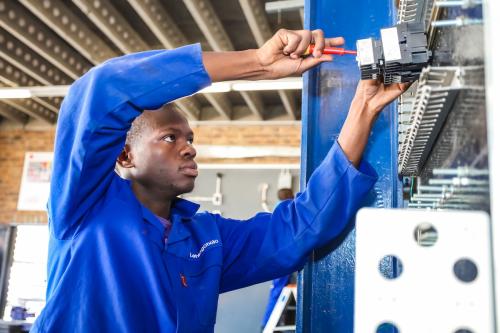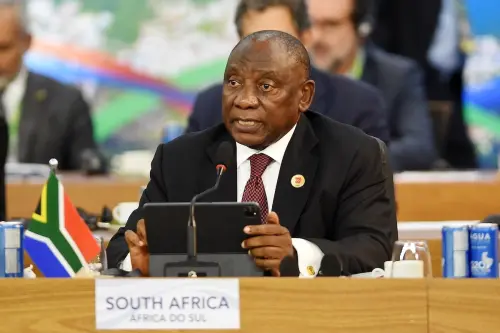This viewpoint is part of Chapter 4 of Foresight Africa 2025-2030, a report with cutting-edge insights and actionable strategies for Africa’s inclusive and sustainable development in the run-up to 2030. Read the full chapter on effective governance.
It will be pivotal to identify savvy policy options to reconcile rising debt costs with public resistance to economic reforms.
Policymakers and politicians are increasingly concerned about the impact of sovereign debt on meeting the Sustainable Development Goals (SDGs) by 2030. In 2023, debt servicing costs and interest payments in low and middle-income countries reached a record high of $1.4 trillion.1 This diverts much-needed resources for investments in health care, education, and agriculture, all of which are essential for meeting several of the SDGs. In Africa, the concern is particularly acute given that governments’ debt burdens have returned to levels witnessed in the late 1990s when the Heavily Indebted Poor Countries Initiative began.2 The expansion into Eurobonds and other commercial financing during the 2010s, as well as diversification toward other donors outside the Paris Club of creditors,3 rising global interest rates, and the COVID-19 pandemic collectively contributed to the region’s re-escalating debt.4
However, as previous debt crises from the 1980s and 1990s demonstrate, tackling rising debt poses distinct challenges for African governments since obtaining a bailout from the International Monetary Fund (IMF) typically requires adopting unpopular austerity and revenue mobilization measures.5 The challenge is especially daunting in electoral democracies where governments fear the consequences of retrenching subsidies, freezing civil servants’ wages, and raising taxes. For instance, even after former President Edgar Lungu of Zambia defaulted on the country’s debt in late 2020, he refused to abandon $500 million in contracts to support the fertilizer subsidy program in advance of the 2021 elections.6 In Kenya, President William Ruto’s attempts to raise taxes as part of the country’s 2024 Finance Bill, precipitated weeks of public protests in July 2024 that culminated with not only rescinding the Bill but also reshuffling his cabinet.7 In Nigeria, protests erupted after President Tinubu removed costly fuel subsidies in 2023,8 which were then partially reinstated a year later as price inflation escalated.9
Consequently, it will be pivotal to identify savvy policy options to reconcile rising debt costs with public resistance to economic reforms, even those that will have long-term national welfare benefits. In this regard, the lessons from prospect theory—an approach from behavioral economics that highlights that people are naturally more risk averse to certain short-term losses than they are accepting of longer-term, uncertain gains—are instructive.10 This is particularly true in settings where citizens have high mistrust in their governments’ intentions and institutions, which Afrobarometer data reveals has become more pronounced across the continent over the last decade.11 This implies that international financial institutions and governments should be intentional about debt reform measures that could adversely affect the poorest citizens and make sure that adjustment measures, including targeted cash transfers and other forms of social protection, are in place to cushion vulnerable communities before the substantive retrenchment of more unproductive expenditures. In Zambia, for instance, the Extended Credit Facility Arrangement provided by the IMF in 2022 emphasized the need to expand the country’s Social Cash Transfer program to help cushion the impacts of macroeconomic reform on the most vulnerable populations.12
Encouragingly, the largest replenishment of International Development Assistance (IDA) finance—intended to provide grant or low-interest assistance—was announced in December 2024, which will be an important mechanism to help debt-constrained, low-income countries in Africa tackle their development needs as the SDG 2030 deadline approaches.13 While democratic contexts make managing debt more challenging due to the pressures from the electoral cycle, they also may be more likely to provide the foundations for better budget management over the longer-term compared to more autocratic settings due to the former’s higher transparency and information flows. In this regard, the IDA replenishment represents a possible fresh start, providing an opportunity for impartial civil society actors, parliamentarians, and national audit bodies to monitor how governments are sourcing and spending financing to ensure greater expenditure accountability going forward.14
-
Footnotes
- “International Debt Report 2024,” (Washington, D.C.: World Bank, 2024), https://doi.org/10.1596/978-1-4648-2148-6.
- “State of Play of Debt Burden in Africa 2024 Debt Dynamics and Mounting Vulnerability” (Cairo: Afreximbank, 2024), https://www.afreximbank.com/reports/state-of-play-of-debt-burden-in-africa-2024-debt-dynamics-and-mounting-vulnerability/.
- Paris Club creditors are represented by 22, mostly OECD countries, that meet regularly to coordinate on debt management once a debtor country has reached an agreement on an IMF program. See: “Office of Finance Development, Bureau of Economic and Business Affairs: The Paris Club,” U.S. Department of State, March 1, 2000, https://1997-2001.state.gov/issues/economic/fs_000301_parisclub.html.
- “Unpacking Africa’s Debt: Towards a Lasting and Durable Solution” (New York: United Nations, Office of the Special Adviser on Africa, 2024), https://www.un.org/osaa/content/unpacking-debt-africa-towards-lasting-and-durable-solution.
- Nicolas van de Walle, African Economics and the Politics of Permanent Crisis, 1979-2001 (New York: Cambridge University Press, 2001).
- Danielle Resnick, “How Zambia’s Opposition Won,” Journal of Democracy 33, no. 1 (January 2022): 70–84, https://www.journalofdemocracy.org/articles/how-zambias-opposition-won/.
- Evelyne Musambi, “Kenyan President Dismisses Cabinet Ministers after Weeks of Protests over Taxation, Poor Governance” Associated Press, July 11, 2024, https://apnews.com/article/kenya-cabinet-ministers-dismissed-0832b7c3c95b1242097cc0d135e56840.
- Camillus Eboh and Felix Onuah, “Nigeria’s Main Labour Federation to Strike over Fuel Subsidy Removal,” Reuters, June 2, 2023, sec. Africa, https://www.reuters.com/world/africa/nigerias-main-labour-union-strike-over-fuel-subsidy-removal-local-media-2023-06-02/.
- Libby George, “In Deluge of Protests, Fuel Subsidies Prove Hard to Abolish,” Reuters, August 8, 2024, https://www.reuters.com/world/africa/deluge-protests-fuel-subsidies-prove-hard-abolish-2024-08-08/.
- Daniel Kahneman and Amos Tversky, “Prospect Theory: An Analysis of Decision under Risk,” Econometrica 47, no. 2 (March 1979): 263–92, https://doi.org/10.2307/1914185.
- Koffi Amessou Adaba and David Boio, “AD891: Across Africa, Public Trust in Key Institutions and Leaders is Weakening,” Afrobarometer (dispatch), October 31, 2024, https://www.afrobarometer.org/publication/ad891-across-africa-public-trust-in-key-institutions-and-leaders-is-weakening/.
- “Zambia: Request for an Arrangement under the Extended Credit Facility” (Washington, D.C.: International Monetary Fund, 2022).
- “World Bank Group Announces Record $100 Billion IDA Replenishment,” World Bank, December 5, 2024, https://www.worldbank.org/en/news/press-release/2024/12/05/donors-and-world-bank-group-boost-IDA-development.
- Danielle Resnick and Landry Signé, “Democratic Resilience in Africa: Lessons from 2024 Elections,” Brookings Institution (blog), November 12, 2024, https://www.brookings.edu/articles/democratic-resilience-in-africa-lessons-from-2024-elections/.
The Brookings Institution is committed to quality, independence, and impact.
We are supported by a diverse array of funders. In line with our values and policies, each Brookings publication represents the sole views of its author(s).




Commentary
Debt, development, and democracy: Prospects for meeting the SDGs in Africa
April 17, 2025